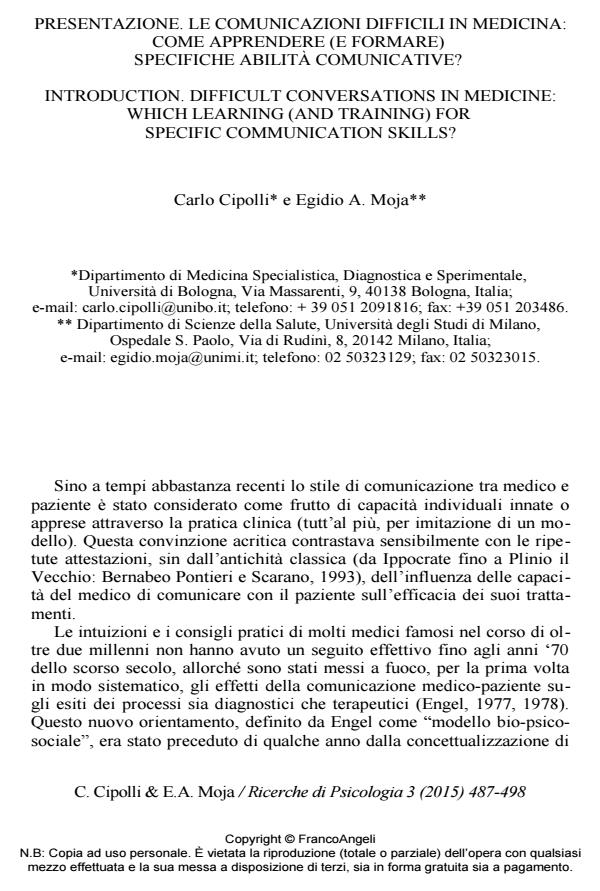Introduction. Difficult conversations in medicine: which learning (and training) for specific communication skills?
Journal title RICERCHE DI PSICOLOGIA
Author/s Carlo Cipolli, Egidio A. Moja
Publishing Year 2015 Issue 2015/3 Language Italian
Pages 12 P. 487-498 File size 162 KB
DOI 10.3280/RIP2015-003003
DOI is like a bar code for intellectual property: to have more infomation
click here
Below, you can see the article first page
If you want to buy this article in PDF format, you can do it, following the instructions to buy download credits

FrancoAngeli is member of Publishers International Linking Association, Inc (PILA), a not-for-profit association which run the CrossRef service enabling links to and from online scholarly content.
- Baile, W.F., Kudelka, A.P., Beale, E.A., Glober, G.A., Myers, E.G., Greisinger, A.J., Bast, R.C.Jr, Goldstein, M.G., Novack, D., & Lenzi, R. (1999). Communication skills training in oncology. Description and preliminary outcomes of workshops on breaking bad news and managing patient reactions to illness. Cancer, 86, 887-97.
- Baile, W.F., Lenzi, R., Parker, P.A., Buckman, R., & Cohen, L. (2002). Oncologists’ attitudes toward and practices in giving bad news: an exploratory study. Journal of Clinical Oncology, 20, 2189-96.
- Balint, M. (1957) The doctor, his patient and the illness. London: Pitman Medical (Trad. It., Medico, paziente e malattia. Milano: Feltrinelli, 1961).
- Barello, S., & Graffigna, G. (2015). Engaging patients to recover life projectuality: an Italian cross-disease framework. Quality of Life Research, 24, 1087-96. DOI: 10.1007/s11136-014-0846-x
- Bernabeo, A., Pontieri, G.M., & Scarano, G.B. (1993). Elementi di storia della medicina. Padova: Piccin. Blendon, R.J., DesRoches, C.M., Brodie, P.H.M., Benson, J.M., Rosen, A.B., Schneider, E., Altman, D.E., Zapert, K., Herrmann, M.J., & Steffenson, A.E. (2002). Views of practicing physicians and the public on medical errors. New England Journal of Medicine, 347, 1933-1940. DOI: 10.1056/NEJMsa022151
- Buckman, R. (1992). How To Break Bad News: A Guide for Health Care Professionals. Baltimore, Md: Johns Hopkins University Press (Trad. it., La comunicazione della diagnosi in caso di malattie gravi. Milano: Cortina, 2003).
- Carney, C.E., Buysse, D.J., Ancoli-Israel, S., Edinger, J., Kristal, A., Lichstein, K.L., & Morin, C. (2012). The Consensus Sleep Diary: Standardizing Prospective Sleep Self-Monitoring. Sleep, 35, 287-302. DOI: 10.5665/sleep.1642
- Crigger, N.J., & Meek, V.L. (2007). Toward a theory of self-reconciliation following mistakes in nursing practice. Journal of Nursing Scholarship, 39, 177-183. DOI: 10.1111/j.1547-5069.2007.00164.x
- Devoto, A., & Lombardo, C. (2012). Intervista semistrutturata sull’insonnia. In D. Coradeschi & A. Devoto (Eds.), Insonnia. Strumenti di valutazione Psicologica (pp. 33-57). Trento: Erickson Edizioni.
- Engel, G.L. (1977) The need for a new medical model: a challenge for biomedicine. Science, 196, 129-36.
- Engel, G.L. (1978). The biopsychosocial model and the education of health professionals. Annals of the New York Academy of Sciences, 310, 169-87.
- Flamigni, C., & Mengarelli, M. (2014). Nella mani del dottore? Il racconto e il possibile futuro di una relazione difficile. Milano: FrancoAngeli.
- Gazelle, G., Liebschutz J.M., & Riess, H. (2015). Physician burnout: coaching a way out. Journal of General Internal Medicine, 30, 508-13. DOI: 10.1007/s11606-014-3144-y
- Hampton, J.R., Harrison, M.J., Mitchell, J.R., Prichard, J.S., & Seymour, C. (1975). Relative contributions of history-taking, physical examination, and laboratory investigation to diagnosis and management of medical outpatients. British Medical Journal, 5969, 486-489.
- Kimball, B.C., James, K.M., Yost, K.J., Fernandez, C.A., Kumbamu, A., Leppin, A.L., et al. (2013). Listening in on difficult conversations: an observational, multi-center investigation of real-time conversations in medical oncology. BMC Cancer, 4, 13:455. DOI: 10.1186/1471-2407-13-455
- Kohn, L.T., Corrigan, J.M., Donaldson, M.S. (Eds.) (2000). To err is human. Building a Safer Health System. Committee on Quality of Health Care in America, Institute of Medicine. Washington, DC: National Academic Press.
- Legg, A.M., & Sweeny, K. (2014). Do you want the good news or the bad news first? The nature and consequences of news order preferences. Personality and Social Psychology Bulletin, 40, 279-288. DOI: 10.1177/0146167213509113
- Maguire, P., Booth, K., Elliott, C., & Jones, B. (1996). Helping health professionals involved in cancer care acquire key interviewing skills--the impact of workshops. European Journal of Cancer, 32, 1486-9. Moja, E.A., & Vegni, E. (2000). La visita medica centrata sul paziente. Milano: Cortina.
- Peterson, M.C., Holbrook, J.H., Von Hales, D., Smith, N.L., Staker, L.V. (1992). Contributions of the history, physical examination, and laboratory investigation in making medical diagnoses. Western Journal of Medicine,156, 163-5.
- Ramirez, A.J., Graham, J., Richards, M.A., Cull, A., & Gregory, W.M. (1996). Mental health of hospital consultants: the effects of stress and satisfaction at work. Lancet, 47(9003), 724-8.
- Rodriguez, D. (2013). Female fertility: a conceptual and dimensional analysis. Journal of Midwifery and Women’s Health, 58, 182-8. DOI: 10.1111/j.1542-2011.2012.00234.x
- Silverman, J., Kurtz, S., & Draper, J. (2013). Skills for communicating with patients. London: Radcliffe Publishing (Trad. it., Competenze per comunicare con i pazienti. Padova: Piccin).
- Washer, P. (2009). Clinical communication skills. Oxford, UK: Oxford University Press.
- White, A., Waterman, A., McCotter, P., Boyle, D., & Gallagher, T. (2008). Supporting healthcare workers after medical errors: considerations for health care leaders. Journal of Clinical Outcomes Management, 15, 240-247.
- Wootton, R. (2012). Twenty years of telemedicine in chronic disease management–an evidence synthesis. Journal of Telemedicine and Telecare, 18, 211-220. DOI: 10.1258/jtt.2012.120219
Carlo Cipolli, Egidio A. Moja, Presentazione. Le comunicazioni difficili in medicina: come apprendere (e formare) specifiche abilità comunicative? in "RICERCHE DI PSICOLOGIA " 3/2015, pp 487-498, DOI: 10.3280/RIP2015-003003